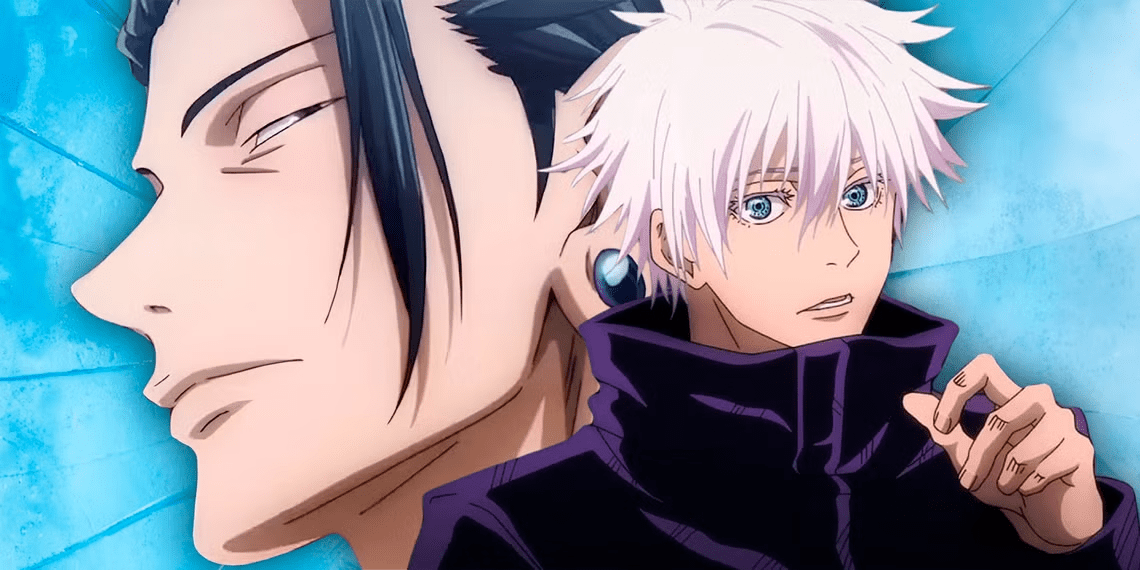In the universe of Jujutsu Kaisen, the complex relationship between Satoru Gojo and Suguru Geto presents a uniquely emotional landscape. Their inseparable bond, marked by camaraderie, later results in a significant emotional rift that creates ripples throughout the narrative of Jujutsu Kaisen and the broader community of fans.
Over the years, fans have portrayed Geto’s character as a personal tragedy, a bittersweet figure entrenched in a complicated relationship. However, a recent revelation from voice actor Yuichi Nakamura, who lends his voice to Gojo, has brought forth a deeper understanding and more nuanced perspectives regarding the dynamics of their relationship.
In a special afternoon event in Japan for the film “Hidden Inventory,” as shared by Jujutsu Kaisen fan @Go_Jover on X, Nakamura revealed insights that illuminate the emotional layers in the separation of the two characters.

Instead of depicting Geto merely as an antagonist to Gojo, Nakamura presented the distance between the characters as a result of differing life philosophies, emphasizing that it does not stem from personal animosity. The divergence is not a rejection but a journey towards different conclusions about living in a world filled with heavy burdens and open-ended possibilities.
Yuichi Nakamura stated: “Even in Jujutsu Kaisen 0, I didn’t think Gojo could truly understand Geto’s thoughts. However, that line logically makes sense thereafter. And even then, I believe Gojo reached a conclusion: ‘As soon as I comprehend that perspective (of Geto), I definitely won’t fight in a way that is counterproductive.’
It’s not that Geto outright rejects Gojo or says, ‘I can’t accept this.’ That line merely determines his actions based on the conclusions he has drawn for himself. Therefore, rather than a shift in their relationship, my thought process is like: ‘Ah, in the end, I have to think entirely differently.’
A philosophical divide, not just a personal tragedy in Jujutsu Kaisen

According to Nakamura, Gojo has never fully grasped the depth of Geto’s internal struggles. However, he acknowledges that this understanding arises from Geto’s decisions. The distinct nature of their relationship is incredibly significant.
Gojo does not view Geto as an irrational adversary or a villain; he simply recognizes that he cannot align with him while still arriving at the same conclusions. This redefining of their connection reflects the shift in their personalities as a result of diverging life experiences, rather than mere enmity.
The key takeaway is that Geto has not publicly rejected Gojo. His decisions to follow a darker path do not stem from resentment or hate. Instead, they result from the culmination of his personal experiences, shaped by his life’s circumstances. The “separation” between them symbolizes a tragic fate that two individuals once shared a goal, but no longer can walk the same path.
The high stakes of becoming the strongest in Jujutsu Kaisen

For Gojo, becoming the strongest is intertwined with the concept of personal sacrifice. Despite his immense power, he cannot help Geto see the world outside or reconcile with his own identity.
Nakamura’s commentary suggests that while Gojo understands Geto’s logic, he must also establish a boundary, choosing a different path because he cannot accept Geto’s extreme conclusions. This choice is not merely tactical; it is also deeply emotional.
The pain that Gojo carries is not just due to their separation. It is the sorrow of recognizing someone too far gone, yet unable to follow him. There are no antagonistic figures in this narrative; only sorrow, reverberations, and the complexities of human relationships.
Jujutsu Kaisen does not offer clear-cut divides or simplistic answers. Instead, it invites viewers to reflect on the pain of relationships that can deteriorate despite the closest of bonds, emphasizing that even the strongest ties can fray when faced with the harsh realities of life.
Source: Screenrant





















